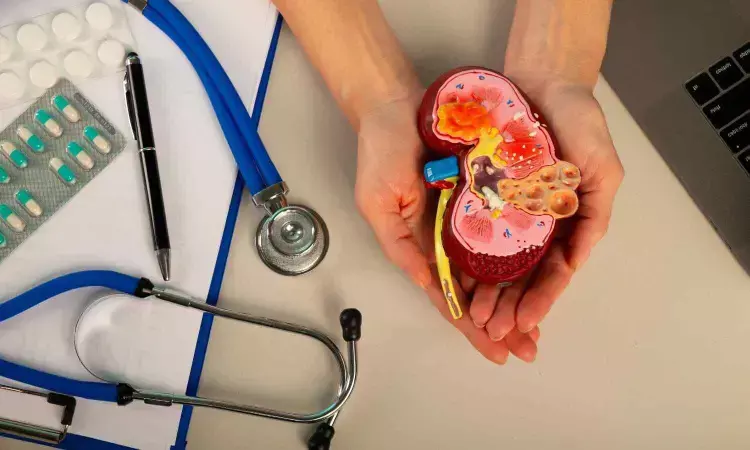- Home
- Medical news & Guidelines
- Anesthesiology
- Cardiology and CTVS
- Critical Care
- Dentistry
- Dermatology
- Diabetes and Endocrinology
- ENT
- Gastroenterology
- Medicine
- Nephrology
- Neurology
- Obstretics-Gynaecology
- Oncology
- Ophthalmology
- Orthopaedics
- Pediatrics-Neonatology
- Psychiatry
- Pulmonology
- Radiology
- Surgery
- Urology
- Laboratory Medicine
- Diet
- Nursing
- Paramedical
- Physiotherapy
- Health news
- Fact Check
- Bone Health Fact Check
- Brain Health Fact Check
- Cancer Related Fact Check
- Child Care Fact Check
- Dental and oral health fact check
- Diabetes and metabolic health fact check
- Diet and Nutrition Fact Check
- Eye and ENT Care Fact Check
- Fitness fact check
- Gut health fact check
- Heart health fact check
- Kidney health fact check
- Medical education fact check
- Men's health fact check
- Respiratory fact check
- Skin and hair care fact check
- Vaccine and Immunization fact check
- Women's health fact check
- AYUSH
- State News
- Andaman and Nicobar Islands
- Andhra Pradesh
- Arunachal Pradesh
- Assam
- Bihar
- Chandigarh
- Chattisgarh
- Dadra and Nagar Haveli
- Daman and Diu
- Delhi
- Goa
- Gujarat
- Haryana
- Himachal Pradesh
- Jammu & Kashmir
- Jharkhand
- Karnataka
- Kerala
- Ladakh
- Lakshadweep
- Madhya Pradesh
- Maharashtra
- Manipur
- Meghalaya
- Mizoram
- Nagaland
- Odisha
- Puducherry
- Punjab
- Rajasthan
- Sikkim
- Tamil Nadu
- Telangana
- Tripura
- Uttar Pradesh
- Uttrakhand
- West Bengal
- Medical Education
- Industry
New approach to kidney transplant matching could lead to better long-term outcomes: Study

Researchers at the University of Pittsburgh have identified a new way of predicting whether a kidney donor and recipient are a good match for transplantation.
The findings, published today in Science Translational Medicine, could complement existing methods to identify patients at higher risk of rejecting a new kidney and who may benefit from additional immunosuppression to reduce that risk.
“The dream of any kidney transplant surgeon is one transplant for life,” said senior author Aravind Cherukuri, M.D., Ph.D., assistant professor of medicine, surgery and immunology at Pitt, co-director of clinical research at the Thomas E. Starzl Transplantation Institute and nephrologist at UPMC. “That goal has not been achieved yet, but even small advances in prolonging the life of a transplant would be amazing because it will reduce the need for organs and the number of people on waitlists.”
Before a kidney transplant, clinicians determine whether donors and recipients are a good match by evaluating their human leukocyte antigens (HLA). According to Cherukuri, HLA is the genetic fingerprint of the transplanted organ and allows the immune system to distinguish self from non-self. When T cells recognize foreign HLA molecules on a transplanted organ, they initiate immune responses that can lead to inflammation, scarring and eventual graft failure.
“HLA matching is the main way of risk stratifying when it comes to kidney transplant,” said Cherukuri. “Even with a good HLA match, recipients must take immunosuppressant drugs for the rest of their lives to reduce the chance of rejection. However, there has been stagnation in the field in terms of new tools to identify rejection risk and development of new therapies to reduce that risk.”
The new study describes a novel tool to help stratify rejection risk in the form of a cell surface receptor called SIRP-alpha, found on innate immune cells called monocytes.
The research builds on a 2017 Science Immunology study by co-senior author Fadi Lakkis, M.D., now a professor in the Division of Nephrology in the Department of Medicine at Stanford University, who did this research while at Pitt and UPMC, which found that SIRP-alpha is involved in distinguishing self from non-self in mice.
Now, Cherukuri, Lakkis and their team have found evidence that similar SIRP-alpha mismatches contribute to transplant rejection, premature scarring and graft failure in humans and suggest that SIRP-alpha matching between donors and recipients could be an important clinical tool for risk stratification and eventually improving transplant outcomes.
The researchers started by establishing the link between SIRP-alpha mismatch and worse rejection in mice and then screened thousands of human genomes from publicly available repositories. They categorized the 10 most commonly prevalent SIRP-alpha gene variants into two groups, which they named A and B.
Then they compared 455 donor-recipient pairs from transplants performed at UPMC and showed that when the SIRP-alpha type did not match — that is, when one had A and one had B — there was increased early acute graft rejection, more scarring and worse long-term transplant outcomes compared to when they matched.
They also validated these findings in an independent cohort of 258 kidney transplant donor-recipient pairs from Northwestern University.
The researchers say that SIRP-alpha testing could complement, not replace, HLA matching in kidney transplantation.
“Testing for SIRP-alpha type could provide an extra armament in the armory of physicians when it comes to stratifying rejection risk for transplant patients,” he said. “It could help us identify a subset of patients who could benefit from an enhanced immunosuppressant regime. This is exciting because it’s one step forward in the direction of personalized immunosuppression.”
Cherukuri and his team now plan to investigate whether therapeutics that target monocytes, such as corticosteroids, could improve kidney transplant outcomes when donors and recipients have SIRP-alpha mismatches.
Reference:
Daqiang Zhao et al. ,Donor-recipient mismatch at the SIRPA locus adversely affects kidney allograft outcomes.Sci. Transl. Med.17,eady1135(2025).DOI:10.1126/scitranslmed.ady1135
Dr Kamal Kant Kohli-MBBS, DTCD- a chest specialist with more than 30 years of practice and a flair for writing clinical articles, Dr Kamal Kant Kohli joined Medical Dialogues as a Chief Editor of Medical News. Besides writing articles, as an editor, he proofreads and verifies all the medical content published on Medical Dialogues including those coming from journals, studies,medical conferences,guidelines etc. Email: drkohli@medicaldialogues.in. Contact no. 011-43720751


